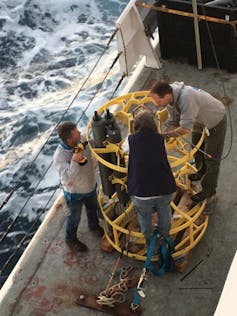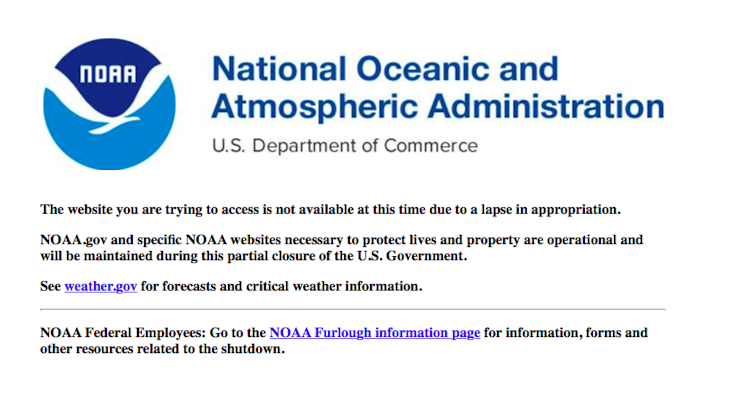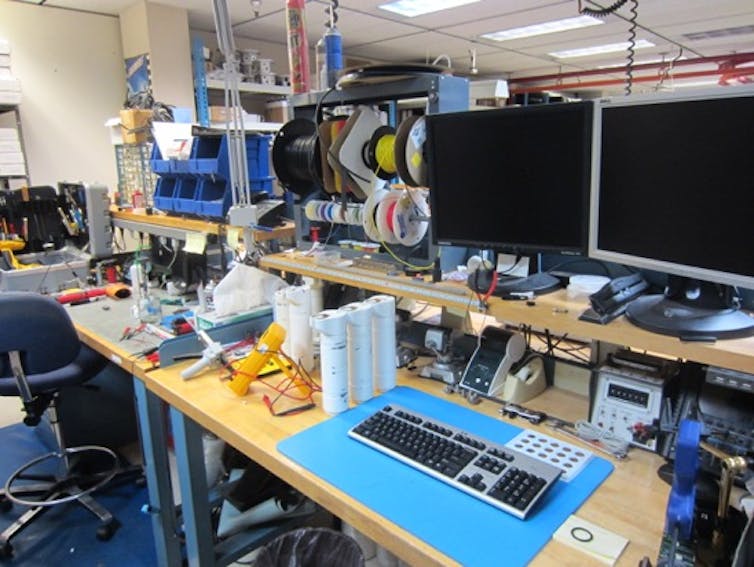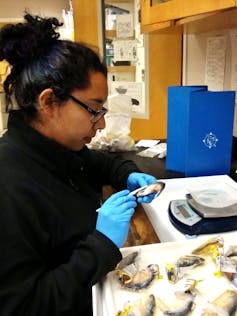University scientists feel the pain of the government shutdown, too
- Written by Nicholas Bond, Washington State Climatologist and Associate Professor of Atmospheric Sciences, University of Washington
I am very fortunate. My work involves research on topics of interest and importance (OK maybe I’m biased) related to the climate and oceanography of the North Pacific[1], and the weather of the Pacific Northwest.
My primary office is at the Pacific Marine Environmental Laboratory of the National Oceanographic and Atmospheric Administration, in Seattle, Washington, in a lovely setting on the shore of Lake Washington. My coworkers are an interesting bunch of folks doing a variety of work ranging from the chemical oceanography of deep-sea volcanoes[2] to the causes and effects of declining sea ice in the Arctic[3]. This research involves the design and fabrication of innovative instrumentation, with most of this activity carried out in the laboratories and test benches on site.
It’s usually a bustling place. But these days, it’s been distressingly quiet.
The reason, of course, is the partial shutdown of the federal government[4], which has resulted in the furlough of “non-essential” employees of NOAA, a branch of the Department of Commerce.
I’m actually an employee of the University of Washington, so in principle, I should not be affected by the shutdown. But that’s far from the case, and my situation is by no means isolated.
 A UW research scientist works with two NOAA scientists on an instrument before heading out on a cruise to Mexico’s northern coast.
Simone Alin/NOAA, CC BY[5][6]
A UW research scientist works with two NOAA scientists on an instrument before heading out on a cruise to Mexico’s northern coast.
Simone Alin/NOAA, CC BY[5][6]
The Joint Institute for the Study of the Atmosphere and Ocean (JISAO) at UW has about 115 employees – and 89 of them have a federal facility as their primary place of work. The JISAO contingent at the NOAA lab actually outnumbers the federal employees. And JISAO is just one of 16 cooperative institutes at universities[7] in the U.S. through which academic and NOAA scientists collaborate.
As a principal investigator whose paycheck comes from the university, I’ve been more hampered than crippled by the shutdown. There remains a seemingly infinite amount of work that can be done: papers to read, current projects needing attention, proposals to prepare. Much of this kind of work can be done away from the office. And I must admit that I kind of enjoyed the first few days; if nothing else the phone hardly rings at the temporary office I’m using.
But now I am getting really peeved. I was counting on being able to make headway on a study of past cold-air outbreaks in the Pacific Northwest, and really need to use a web application maintained by NOAA’s Air Resources Laboratory. Some other research in my pipeline requires climate model data sets hosted by NOAA, but again, no dice.
 Screenshot of what greets visitors to many NOAA websites during the shutdown.
NOAA[8]
Screenshot of what greets visitors to many NOAA websites during the shutdown.
NOAA[8]
One might suppose that a slowing of the research being conducted in my field is no big deal. But there are ramifications.
Take weather forecasting. Both day-to-day forecasts and seasonal projections rely on complex computer models. These models need care and feeding; there is continual development and improvement carried out by a cadre of federal and nonfederal (academic and contractor) types. All of this is basically on hold. To be sure, forecasts are still being produced by National Weather Service personnel temporarily working for free, but it is a setback. And this kind of pause is happening all over the country, in a variety of disciplines, at research centers that collaborate with federal agencies – when the government isn’t shut down.
The work not being done will have some lasting effects. For example, a research cruise in the Atlantic Ocean scheduled to begin in about a month was going to include instrumentation for measuring various chemical properties including pH. Now it looks like equipment will not be able to be prepped and shipped in time. This will constitute a serious gap in the record.
 Ongoing monitoring – like this time series of temperatures on the Bering Sea shelf – is necessary to track accurately how environmental conditions are changing.
Phyllis Stabeno/NOAA, CC BY-ND[9]
Ongoing monitoring – like this time series of temperatures on the Bering Sea shelf – is necessary to track accurately how environmental conditions are changing.
Phyllis Stabeno/NOAA, CC BY-ND[9]
It bears emphasizing that there are a variety of roles filled by JISAO personnel at NOAA, and the extent to which these individuals can roll with the punches associated with the shutdown also varies.
Support scientists employed by the university are in a particularly tough spot. These are the people who carry out the essential tasks of preparing and calibrating equipment, going to sea on research cruises – a duty generally less glamorous than the term suggests – analyzing samples in the lab, and processing and posting the precious data that we go to so much trouble to collect. There is not much glory here, but these folks are committed to what they are doing and take justifiable pride in their work.
 Workstations at NOAA/PMEL are now empty, even though many of the people who staff them are actually employed by the university.
Jed Thompson/JISAO, CC BY-ND[10]
Workstations at NOAA/PMEL are now empty, even though many of the people who staff them are actually employed by the university.
Jed Thompson/JISAO, CC BY-ND[10]
As the shutdown has dragged on, and PMEL and other federal facilities remain closed, the options for these individuals have become increasingly limited. Those whose work directly involves equipment and instrumentation are especially in a bind. Many have been able to be productive by updating manuals or online training, but are running out of things to do. Those tasked with data processing and management often use specialized software on their desktop computers – this kind of work can’t be done on one’s laptop at the local Starbucks.
JISAO and federal employees work alongside one another, and the distinctions are usually blurred. In many cases, these folks have similar duties and tenures, and it’s not much more than a matter of chance whether one is a federal or nonfederal employee.
But now that distinction is important, because different rules are in play for the federal and nonfederal employees. Federal employees on furlough will be receiving back pay. This does not apply to JISAO employees, and for that matter, all their counterparts across the country associated with the different agencies being directly affected by the impasse.
 At a certain point during the shutdown, people run out of work to do.
University of Washington, CC BY-ND[11]
At a certain point during the shutdown, people run out of work to do.
University of Washington, CC BY-ND[11]
If JISAO employees cannot carry out meaningful work benefiting the grant projects they’re working under, they must either find a project to which they can contribute (which is difficult to say the least), take vacation time, or worst of all in most cases, go on leave without pay.
Some individuals have already been forced to use leave or go without pay, with poor prospects for reimbursement, and I fear that their ranks will swell. JISAO is doing what it can on behalf of its employees, as are the other NOAA cooperative institutes, especially toward minimizing the “nuclear option” of forced leave without pay. Given the requirements accompanying university employees working on federal grants, that is proving to be no cinch.
Here’s a fervent plea for an agreement to be reached somehow so that we can get back to our regular work. I am chomping at the bit, and I expect that I speak for a lot of people.
References
- ^ oceanography of the North Pacific (theconversation.com)
- ^ chemical oceanography of deep-sea volcanoes (doi.org)
- ^ declining sea ice in the Arctic (doi.org)
- ^ partial shutdown of the federal government (theconversation.com)
- ^ Simone Alin/NOAA (www.washington.edu)
- ^ CC BY (creativecommons.org)
- ^ 16 cooperative institutes at universities (ci.noaa.gov)
- ^ NOAA (government-shutdown.noaa.gov)
- ^ CC BY-ND (creativecommons.org)
- ^ CC BY-ND (creativecommons.org)
- ^ CC BY-ND (creativecommons.org)
Authors: Nicholas Bond, Washington State Climatologist and Associate Professor of Atmospheric Sciences, University of Washington
Read more http://theconversation.com/university-scientists-feel-the-pain-of-the-government-shutdown-too-110415

